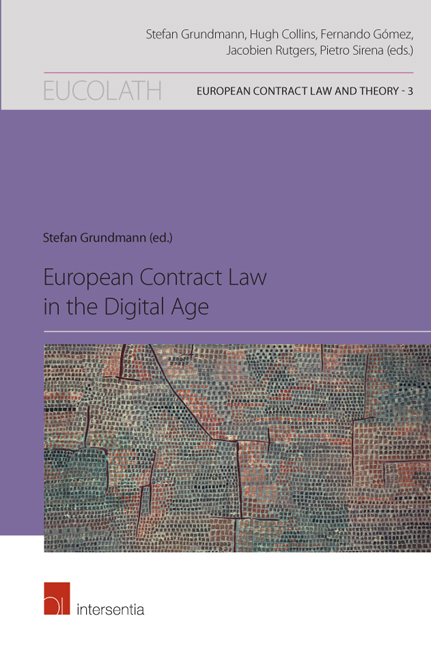Book contents
- Frontmatter
- Contents
- Table of Cases
- List of Authors
- PART I The Overall Architecture
- The Digital Dimension as a Challenge to European Contract Law – The Architecture
- Part II Institutional Framework – Platforms, Regulation Issues, Global Surroundings
- Part III Digital Formation of Contract – More Virtual and More Formalised
- Part IV Development and Implementation of Contract – More Digital, More Liquid
- Part V Digital Objects of Contract – CESL II and More
- Index
- European Contract Law and Theory Series
The Digital Dimension as a Challenge to European Contract Law – The Architecture
from PART I - The Overall Architecture
Published online by Cambridge University Press: 11 October 2018
- Frontmatter
- Contents
- Table of Cases
- List of Authors
- PART I The Overall Architecture
- The Digital Dimension as a Challenge to European Contract Law – The Architecture
- Part II Institutional Framework – Platforms, Regulation Issues, Global Surroundings
- Part III Digital Formation of Contract – More Virtual and More Formalised
- Part IV Development and Implementation of Contract – More Digital, More Liquid
- Part V Digital Objects of Contract – CESL II and More
- Index
- European Contract Law and Theory Series
Summary
ABSTRACT
In this introductory chapter, we offer an overview of the interactions between digital technologies and contract law. We identify three pillars in this architecture: the regulatory framework; digital interventions over the life-cycle of the contract; and digital objects of contracting. The regulatory framework, which itself may draw on digital technology to effectively pursue its ends, shapes, and is shaped by, the other two pillars. More specifically, on the one hand, we show how four key technologies – digital platforms, Big Data analytics, artificial intelligence, and blockchain – are being used at different stages of the contractual process (from the screening for contractual partners to formation, enforcement and interpretation) and engender novel market dynamics that, in many instances, necessitate regulatory responses. On the other hand, digitally facilitated contracting increasingly relates to digital content as the object of the contract. However, while this area has notably been shaped by the proposed Directive on Contracts for the Supply of Digital Content, we argue that a number of important blind spots remain that fail to be addressed by the directive. All in all, the digital dimension of contracting will likely reinforce an adaptive, relational view and practice of contracting. This increased fluidity engenders a vast potential for preference-conforming, time-sensitive contracts; however, to the extent that it also mirrors novel asymmetries of information and power, the ordering mechanisms of the law may simultaneously be more needed than ever.
CHALLENGES AND CORE FEATURES OF AN ‘ARCHITECTURE’
The digital dimension and its challenges and repercussions for contract law in Europe – or ‘European Contract Law’ – are not a narrow issue.
It may therefore be wise to specify three things in a bird’ s-eye view first: (i) what kind of contract law and contract law perspective we are mainly interested in; (ii) what vision of ‘European Contract Law ’ we base our discussion on; and finally (iii) what the main thrust of the chapter (and book) is and, linked to this question, which ingredients are included as being important for this purpose.
WHAT PLACE FOR CONTRACT LAW IN THE DIGITAL ARENA?
The broader the issue, the more a certain understanding of law and contract law may have a bearing on how to treat the issue (one could also say a certain ‘preconception’ of how to so).
- Type
- Chapter
- Information
- European Contract Law in the Digital Age , pp. 3 - 46Publisher: IntersentiaPrint publication year: 2018
- 5
- Cited by



